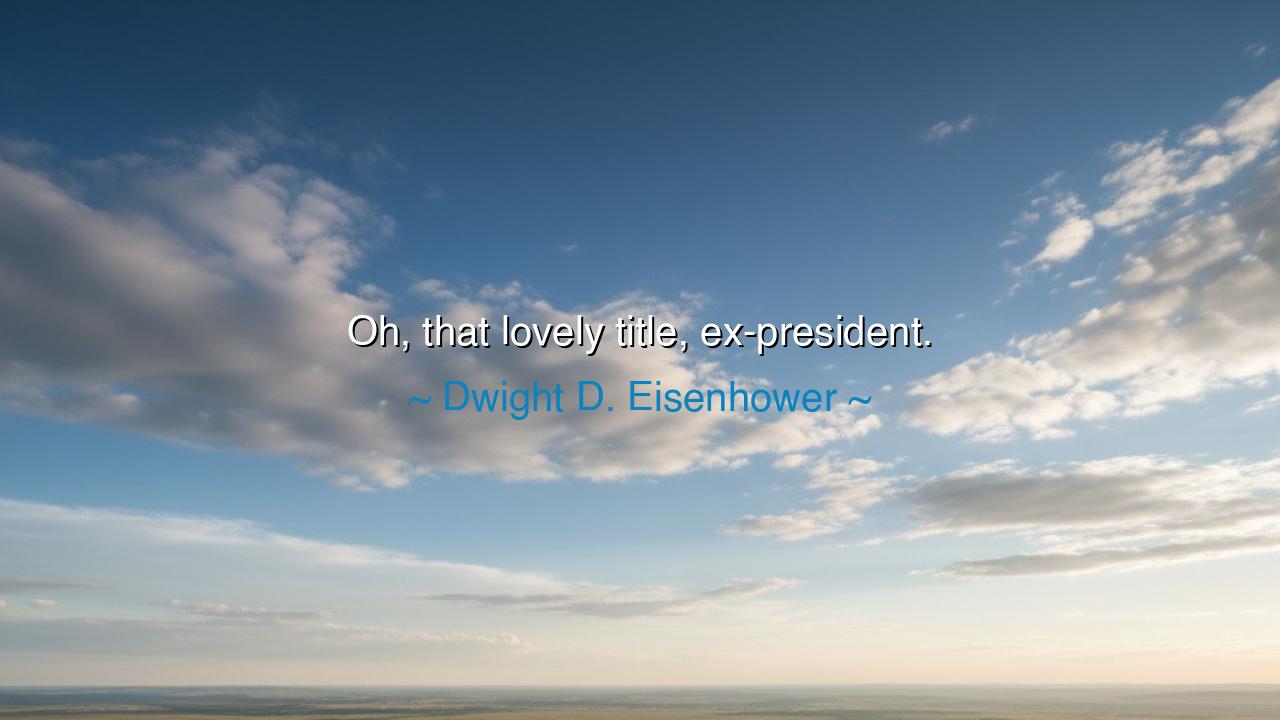
Oh, that lovely title, ex-president.






The words of Dwight D. Eisenhower — “Oh, that lovely title, ex-president.” — are simple in form, yet profound in spirit. They reveal the heart of a man who had borne the greatest burden of power and welcomed its release. For to be president is to carry the weight of nations, to live not for oneself but for millions, to awaken each morning with the shadow of history pressing upon one’s shoulders. But to be an ex-president is to have fulfilled that duty and to step, at last, into the freedom of a private man.
This saying was born from Eisenhower’s own journey. As president of the United States from 1953 to 1961, he navigated the storms of the Cold War, the dawn of the nuclear age, and the first tremors of the civil rights movement. Before that, he had commanded armies in the crucible of World War II. His life was a continuous march through responsibility, sacrifice, and vigilance. Thus, when he laid down the mantle of president, the words he spoke were not of regret but of deep relief — the relief of one who has carried the cross to its end and now embraces rest.
History has shown that the title of ex-president can be both burden and blessing. Consider George Washington, who after leading a revolution and guiding a new nation, refused a crown and stepped aside, choosing the quiet of Mount Vernon over endless power. In doing so, he taught the world that the noblest act of leadership is to surrender it. Eisenhower’s words echo this same truth: that greatness lies not only in ruling, but in knowing when to step away.
The meaning runs deeper still. In celebrating the title of ex-president, Eisenhower reminds us that no office, no matter how high, defines the whole of a man. Leadership is a season, but humanity is eternal. Power may shape history, but peace shapes the soul. The true dignity of the president is found not only in how he governs, but in how he lets go.
Let these words endure as wisdom for future generations: the glory of power is fleeting, but the honor of duty fulfilled endures forever. To cherish the title of ex-president is to understand that service is sacred, but release is freedom. Thus, Eisenhower’s voice speaks across the ages: do your work, bear your burden, and when the time comes, step down with joy — for in that act lies the truest measure of a statesman.






NNThuan Nguyen ngoc
Eisenhower’s comment about the title 'ex-president' seems to convey a sense of disinterest or even discomfort with the idea of post-presidency fame. Is he subtly commenting on the way former presidents are treated, often becoming less relevant once they leave office? Maybe it's also a reflection on the transient nature of political power, where even the highest title loses its meaning once you're no longer in the role. How does this quote change our view of political careers after office?
YNDinh Thi Yen Nhi
Eisenhower’s statement seems to convey a bit of irony about the title of 'ex-president.' It’s a title that many people might view as prestigious, but Eisenhower’s tone makes it sound almost insignificant or unremarkable. Is this a critique of the way former leaders are viewed, or does it speak to the nature of power itself—how it can be so fleeting and transient? I wonder if this perspective on titles reflects a more humble approach to leadership.
NBnhung bui
This quote is fascinating because it captures the sometimes humorous yet stark reality of political life. Being president comes with immense power and influence, but once that ends, the title of 'ex-president' feels almost anticlimactic. What does this quote say about the impermanence of political leadership? Is Eisenhower subtly critiquing the concept of titles and the way society places importance on them, or is it more about his own perspective on life after the presidency?
GDGold D.dragon
Eisenhower’s quote is intriguing—it seems almost dismissive of the title 'ex-president.' Does it reflect his ambivalence about the office, or is it a humorous comment on the fleeting nature of power? Maybe it's a recognition of how the title, though prestigious, becomes less significant once the responsibilities are over. Could it be that Eisenhower is commenting on how the power associated with the presidency quickly fades once you're no longer in the position?